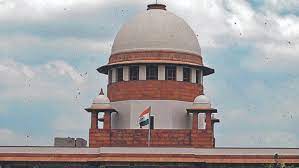Whereby Writ Petition (Civil) No.1212 of 1995 was dismissed confirming the order of forfeiture of properties under section 7 of The Smugglers and Foreign Exchange Manipulators (Forfeiture of Property) Act, 1976 [SAFEMA]. (Para 1)
The main ground of challenge in both the cases was that as the detention order passed under section 3 of the Conservation of Foreign Exchange and Prevention of Smuggling Activities Act, 19742 has been subsequently revoked/withdrawn as such SAFEMA proceedings would become non est and untenable. An additional ground taken in Civil Appeal No.5500 of 2011 was to the effect that even the criminal complaint filed under the Customs Act, 1962 [The Act 1962] wherein the appellant had been discharged on the ground that there was no evidence, would further render the proceedings under SAFEMA as untenable. (Para 2)
At the outset, the arguments advanced by the learned senior counsel for the appellant appears to be quite attractive and forceful but when the facts and law of the case are scrutinised, we are of the firm view that argument has to fail resulting into dismissal of the appeals. (Para 3)
Primarily, the argument of the appellant is twofold: firstly, benefit is said to be derived from the revocation of the detention order passed under COFEPOSA and secondly, the dismissal of the complaint and the withdrawal of the penalty under the Act 1962 and Act 1968. (Para 19)
In so far as the second argument is concerned, it has no relevance to the applicability or non-applicability of the impugned proceedings and forfeiture under SAFEMA. They were independent proceedings under the provisions of the Act 1962 and the Act 1968. (Para 20)
The order of detention had not been revoked on the report of the Advisory Board or before the receipt of the report of Advisory Board or before making a reference to the Advisory Board. Further, it was an order of detention passed under Section 3 of COFEPOSA. Section 9 and Section 12 A of COFEPOSA had no application to the detention order. As such, clause (i) would not be applicable. (Para 22.1)
Clause (ii) would also not be applicable in as much as neither the detention order was made to which provisions of Section 9 of COFEPOSA would apply nor had it been revoked before the expiry of the time on the basis of review on the report of the Advisory Board. (Para 22.2)
Further, clause (iii) would also not be applicable as Section 12A of COFEPOSA had no application to the detention order. (Para 22.3)
Lastly, the detention order had not been set aside by the Court of competent jurisdiction. Therefore, clause (iv) would have no application. (Para 22.4)
To the contrary, in the present case against the detention order, the appellant had made a representation which had been rejected. Thereafter the said order was challenged before the High Court by way of a writ petition which had also been dismissed on merits by a detailed order upholding the detention order. The revocation however had been made on a statement given on behalf of the Union of India before this Court in order to institute a complaint under the relevant statute. The said revocation is not contemplated under Section 2(2)(b) and its proviso, and, therefore, no benefit can be extended to the appellant(s) on the said count. Therefore, in our view, the impugned judgment does not suffer from any infirmity warranting interference. The appeals lack merit and are, accordingly dismissed. (Para 23)
SUPREME COURT OF INDIA
2023 STPL(Web) 416 SC
[2023 INSC 997]
Thanesar Singh Sodhi (D) Thr. Lrs. Vs. Union Of India And Ors.
Civil Appeal No.5500 of 2011 with Criminal Appeal No.730 of 2014-Decided on 9-11-2023
https://stpllaw.in/wp-content/uploads/2023/11/2023-STPLWeb-416-SC.pdf







